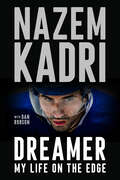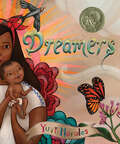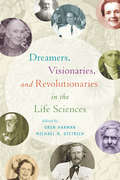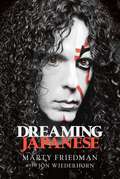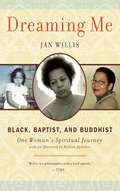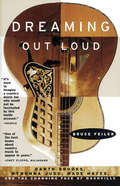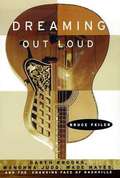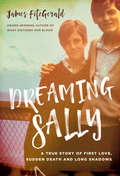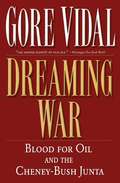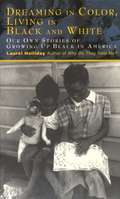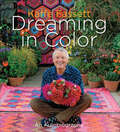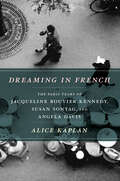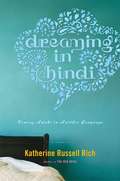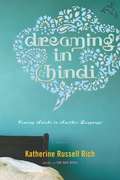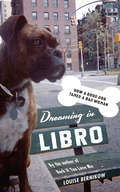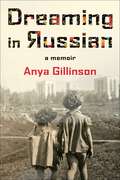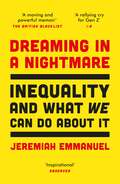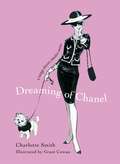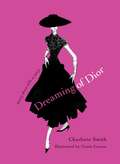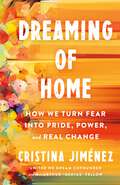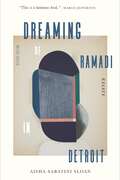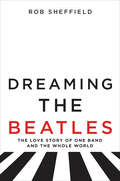- Table View
- List View
Dreamer: My Life On the Edge
by Nazem KadriAn outspoken, inspirational memoir from a charismatic athlete in the spotlight, Dreamer is the moving story of the first Muslim hockey player to win the Stanley Cup, and the impossible dreams he made a reality.No one who knows the game is unfamiliar with the story of the NHL&’s first Muslim Stanley Cup winner, Nazem Kadri, nor does anyone doubt his warmth and openness in front of a microphone, or his eagerness to challenge the next generation of Muslim athletes. He is a league All-Star, a highlight-reel player, and someone who has been called upon to be the face of his community from the moment he put on skates.Nazem Kadri was a top-ten draft pick of the Toronto Maple Leafs, chosen not only for his elite skills but because he would reflect Toronto&’s immense diversity and huge Muslim population. And he was soon a fan favourite, not only with a new generation of diverse fans, but with traditionalists too, who admired his willingness to play the game with old-school toughness. In the end, he was traded to Colorado as management sought to shake up the team. But it was the Avalanche, not the Leafs, who benefitted most, and Toronto fans missed him. When Colorado won the Stanley Cup in 2022, Kadri (by then a fan favourite in Denver) was a clutch player in high-pressure games. Today he is a veteran leader with the Calgary Flames, and still making the highlight reels. But the core of Kadri's story is what happened off the ice—both shocking and heartwarming. Kadri faced brutal anti-Muslim harassment during Colorado's Cup run from Blues fans and received incredible support from Denver fans. When a controversy arose about an uncalled penalty on the championship-winning goal, this founding member of the league&’s Hockey Diversity Alliance used the opportunity to make humorous t-shirts, which raised over $250,000 for the Kadri Foundation.And when he had his traditional day with the Stanley Cup, he took it to the mosque in his hometown of London, Ontario, along with the message that the highest success, not just in hockey but in life, is a destiny any of us can choose.
Dreamers
by Yuyi MoralesWe are resilience. We are hope. We are dreamers. Yuyi Morales brought her hopes, her passion, her strength, and her stories with her, when she came to the United States in 1994 with her infant son. She left behind nearly everything she owned, but she didn't come empty-handed. From the author-illustrator of Bright Star, Dreamers is a celebration of making your home with the things you always carry: your resilience, your dreams, your hopes and history. It's the story of finding your way in a new place, of navigating an unfamiliar world and finding the best parts of it. In dark times, it's a promise that you can make better tomorrows. This lovingly-illustrated picture book memoir looks at the myriad gifts migrantes bring with them when they leave their homes. It's a story about family. And it's a story to remind us that we are all dreamers, bringing our own strengths wherever we roam. Beautiful and powerful at any time but given particular urgency as the status of our own Dreamers becomes uncertain, this is a story that is both topical and timeless. The lyrical text is complemented by sumptuously detailed illustrations, rich in symbolism. Also included are a brief autobiographical essay about Yuyi's own experience, a list of books that inspired her (and still do), and a description of the beautiful images, textures, and mementos she used to create this book. A parallel Spanish-language edition, Soñadores, is also available. Winner of the Pura Belpré Illustrator Award! A New York Times / New York Public Library Best Illustrated BookA New York Times BestsellerRecipient of the Flora Stieglitz Strauss AwardA 2019 Boston Globe - Horn Book Honor RecipientAn Anna Dewdney Read Together Honor BookNamed a Best Book of 2018 by Kirkus Reviews, Publishers Weekly, School Library Journal, Shelf Awareness, NPR, the Boston Globe, the Chicago Tribune, Salon.com-- and many more!A Junior Library Guild selectionA Eureka! Nonfiction HonoreeA Bulletin of the Center for Children's Books Blue Ribbon titleA Bank Street Best Children's Book of the YearA CLA Notable Children's Book in Language ArtsSelected for the CBC Champions of Change Showcase
Dreamers and Doers (Into Reading, Level V #22)
by Darleen RamosNIMAC-sourced textbook. Dreamers and doers are the inventors and scientists who put plans into action. Read about some of the world's biggest dreamers and doers, and learn how their curiosity changed the world forever.
Dreamers, Visionaries, and Revolutionaries in the Life Sciences
by Oren Harman Michael R. DietrichWhat are the conditions that foster true novelty and allow visionaries to set their eyes on unknown horizons? What have been the challenges that have spawned new innovations, and how have they shaped modern biology? In Dreamers, Visionaries, and Revolutionaries in the Life Sciences, editors Oren Harman and Michael R. Dietrich explore these questions through the lives of eighteen exemplary biologists who had grand and often radical ideas that went far beyond the run-of-the-mill science of their peers. From the Frenchman Jean-Baptiste Lamarck, who coined the word “biology” in the early nineteenth century, to the American James Lovelock, for whom the Earth is a living, breathing organism, these dreamers innovated in ways that forced their contemporaries to reexamine comfortable truths. With this collection readers will follow Jane Goodall into the hidden world of apes in African jungles and Francis Crick as he attacks the problem of consciousness. Join Mary Lasker on her campaign to conquer cancer and follow geneticist George Church as he dreams of bringing back woolly mammoths and Neanderthals. In these lives and the many others featured in these pages, we discover visions that were sometimes fantastical, quixotic, and even threatening and destabilizing, but always a challenge to the status quo.
Dreaming Japanese
by Marty FriedmanThe rollicking autobiography of the iconic guitarist who took thrash metal behemoths Megadeth from the edge of collapse to their highest peak before departing to Japan for the joy of J-Pop. Marty Friedman&’s upbringing was as atypical as his career. Growing up in a Jewish household in Maryland, the son of an NSA executive, he lacked motivation until he accidentally discovered the guitar and immediately found his calling. Enjoying a hazy adolescence overflowing with partying, music, and teen antics, he achieved local stardom in Deuce, then burst onto the national scene by pioneering a radically new style of playing, bringing attention to the guitar aficionado label, Shrapnel Records. Acclaim didn&’t breed success or money, but undeterred, Friedman moved to California, and after attempts to join Madonna, KISS, and Ozzy Osbourne, finally scored a gig in Megadeth at a time when the band members were just recovering from the verge of self-destruction, and Marty was in and out of homelessness.Friedman is the most revered guitarist to play in any Megadeth lineup. During his ten years, his exotic, innovating style helped define the sound of their biggest albums, and while it elevated him to guitar hero status with all the accompanying perks, it came at a significant cost. As the only clean and sober member, Friedman vividly recalls the triumphs and trials of each album cycle and more, bringing to light previously undisclosed personal feelings surrounding the circumstances that forced the band into hiding in the midst of the Countdown to Extinction Tour and the brutal effort it took to get the band back up and running. His profound and complicated relationship with frontman Dave Mustaine was symbolic of the band&’s insane dynamic, and Marty poignantly and generously shares his experiences within the band&’s inner sanctum during the highs, lows, and daily routines.But Dreaming Japanese is far more than a memoir about Friedman&’s multi-Platinum years in Megadeth. The riveting narrative captures his relentless perseverance as he struggles to start again from nothing. Spontaneously leaving his home in the US and feeling lost in the middle of Tokyo, with few connections or concrete plans, the story traces his journey to acclimate and assimilate into the inner core of an alien society, language and culture, almost like a double agent spy. In fascinating detail and clarity, Marty shares how he gradually made inroads into the Japanese entertainment industry, becoming a household name and fixture on mainstream television and earning respect as a highly influential solo artist. Dreaming Japanese follows the wildly entertaining, inspiring, and above all, unprecedented path of a rock and roll guitar player who took the biggest risk, leaving worldwide success to start over from scratch in a country, culture and society far from his own, ultimately becoming an official ambassador of Japan.
Dreaming Me
by Jan WillisJan Willis is not Baptist or Buddhist. She is simply both. Dreaming Me is the story of her life, as a child growing up in the Jim Crow South, dealing with racism in an Ivy League college, and becoming involved with the Black Panther Party. But it wasn't until meeting Lama Yeshe, a Tibetan Buddhist monk living in the mountains of Nepal, that she realized who the real Jan Willis was, and how to make the most of the life she was living.
Dreaming Out Loud
by Baby ArielMusical.ly megastar and recording artist Baby Ariel tells the inspiring story behind her empire of more than 35 million fans. Full of revealing personal anecdotes, advice, doodles, and never-before-seen photos! Ariel is all about opening up and being goofy, funny, and completely herself. In her debut book, she talks about every step of her amazing journey: from the good (like being on the cover of Billboard, filming music videos for her original songs, and meeting her amazing fans) to the bad (like overcoming anxiety, handling breakups, and dealing with haters and bullies). Through it all, Ariel has learned one important lesson that she wants her fans to learn, too: You gotta be you, babies.Fierce, funny, and real, Dreaming Out Loud goes behind the scenes in the life of one of today’s most popular influencers, giving you Baby Ariel like you’ve never seen her before.
Dreaming Out Loud
by Bruce FeilerCountry music has exploded across the U.S. and undergone a sweeping revolution, transforming the once ridiculed world of Nashville into an unlikely focal point of American pop culture. Bruce Feiler was granted unprecedented access to the private moments of the revolution. Here is the acclaimed report: a chronicle of the genre's biggest stars as they change the face of American music.From the historic stage of the Grand Ole Opry to the dim light of a recording studio, here is a ruggedly authentic behind the scenes tour that takes you places outsiders have never been allowed to go. Part social history, part backstage pass, this penetrating and graceful book presents the most comprehensive portraits yet painted of Garth Brooks and Wynonna Judd-two of the most celebrated artists of our times-as well as a touching picture of Wade Hayes, a young man who hopes to follow them to the exalted heights of one of America's richest traditions: the world of country music.
Dreaming Out Loud: Garth Brooks, Wynonna Judd, Wade Hayes, and the Changing Face of Nashville
by Bruce FeilerCountry music has exploded across the U.S. and undergone a sweeping revolution, transforming the once ridiculed world of Nashville into an unlikely focal point of American pop culture. Bruce Feiler was granted unprecedented access to the private moments of the revolution. Here is the acclaimed report: a chronicle of the genre's biggest stars as they change the face of American music.
Dreaming Sally: A True Story of First Love, Sudden Death and Long Shadows
by James FitzGeraldPrize-winning author James FitzGerald explores how the death of an eighteen-year-old girl in the summer of 1968 forever changed his life and the life of the other man who loved her. Dreaming Sally is a deeply moving exploration of the weight of a life cut short.Sally will die in Europe this summer. George Orr dreamed that his girlfriend, Sally Wodehouse, would die on the trip she wanted to take, and he begged her not to go. But Sally did not take him seriously--how could she? She left for Europe in July 1968 with twenty-five other private-school kids, on "The Odyssey," a Sixties version of the Grand Tour. In August 1968, only hours after becoming engaged to George via telegram, she died as he had dreamed she would, in a freak accident. Sally was George's first love, but she was also James FitzGerald's. James first met Sally at a family cottage; he was drawn to her energy and warmth, a stunning contrast to the chilly emotional life of his own family. At seventeen, not exactly a hit with the girls, James was delighted when he realized that he'd be spending the summer with his old friend. And soon, even though he knew that Sally had a serious boyfriend back home, they became inseparable, touring the glories of Western culture by day, dancing and drinking the nights away--giddily unshackled from the expectations and requirements of their class and upbringing. To George and James, both sons of parents who knew how to make demands of their children but not how to love them, Sally represented all the optimism and promised freedom of the '60s. Her death has haunted both men for fifty years--arresting their development, miring them in grief and unreasoning guilt. Dreaming Sally is a profound and evocative exploration of the long shadow left by an eighteen-year-old girl, an uncanny story of first love, sudden death and the complexity of trauma and mourning.
Dreaming War: Blood for Oil and the Cheney-Bush Junta (Nation Books)
by Gore VidalWhen Gore Vidal's recent New York Times bestseller Perpetual War for Perpetual Peace was published, the Los Angeles Times described Vidal as the last defender of the American republic. In Dreaming War, Vidal continues this defense by confronting the Cheney-Bush junta head on in a series of devastating essays that demolish the lies American Empire lives by, unveiling a counter-history that traces the origins of America's current imperial ambitions to the experience of World War Two and the post-war Truman doctrine. And now, with the Cheney-Bush leading us into permanent war, Vidal asks whose interests are served by this doctrine of pre-emptive war? Was Afghanistan turned to rubble to avenge the 3,000 slaughtered on September 11? Or was "the unlovely Osama chosen on aesthetic grounds to be the frightening logo for our long contemplated invasion and conquest of Afghanistan?" After all he was abruptly replaced with Saddam Hussein once the Taliban were overthrown. And while "evidence" is now being invented to connect Saddam with 9/11, the current administration are not helped by "stories in the U. S. press about the vast oil wealth of Iraq which must- for the sake of the free world- be reassigned to U. S. consortiums. "
Dreaming in Color, Living in Black and White
by Laurel Holliday"I constantly questioned myself as a child. All of the positive images of people I'd seen were white. To be beautiful, you not only had to be stick-skinny, with no behind, you had to have long silky blond hair and blue eyes, a thin nose, and thin lips. I just didn't measure up."-- Charisse Nesbit, Maryland. These true stories from every part of America tell what it was like growing up in a world where the color of people's skin set them apart. How do you feel when a teacher doesn't believe that you wrote the story he thinks is great? How can you make friends and belong in a black school when your father is black and your mother is Puerto Rican?What do you do when you're working in the kitchen of a summer camp in Vermont, but you're not allowed to swim in the camp lake? All of the writers' pain, confusion, humiliation, and rage are vividly expressed, but many of them went on to struggle against overwhelming odds and realize their dreams. Their voices offer hope, inspiration, and a challenge to us all.
Dreaming in Color: An Autobiography
by Kaffe FassettIn this memoir, the renowned visual artist chronicles his life and career, as well as what is important to him and what inspires his art. Kaffe Fassett has led an extraordinary life and is a captivating storyteller with a vivid memory. Born in 1937, he spent much of his youth in Big Sur, California, where his parents bought a cabin from Orson Welles and transformed it into the world-famous Nepenthe restaurant, a gathering place for artists and bohemians. After attending a boarding school run by the disciples of Krishnamurti, an Indian guru, he studied painting at the School of the Museum of Fine Arts in Boston, then traveled to England, where he made his home. After an inspiring trip to Inverness, Scotland, Fassett began designing knitwear for Bill Gibb, and then the Missonis, Vogue magazine, and private clients like Lauren Bacall and Barbra Streisand, and, in the process, revolutionized the handknitting world with his explosive use of color. Further explorations led him to needlepoint, mosaics, rugmaking, tapestries, yarn and fabric design, costume and set design, and quilting. Now in his seventies, Fassett continues to produce new work and to travel worldwide to teach and lecture. In this intimate autobiography, Fassett shares rich, detailed stories about his lifelong creative journey as well as hundreds of glorious photos taken along the way.Praise for Dreaming in Color &“Lavishly illustrated with photographs from his life and work and dishing on everyone from Dustin Hoffman to Princess Margaret, Dreaming in Color describes a charmed life filled with creativity, big personalities, travels, and not a little serendipity.&” —Vogue Knitting &“A feast for the eyes.&” —Shelf-Awareness &“[Fassett] is a legend in the knitting world for his exquisitely colorful, highly patterned designs. . . . Kaffe Fassett is to color what Julia Child was to French cooking.&” —Knitter&’s Review
Dreaming in French: The Paris Years of Jacqueline Bouvier Kennedy, Susan Sontag, and Angela Davis
by Kaplan Alice YaegerA year in Paris . . . since World War II, countless American students have been lured by that vision--and been transformed by their sojourn in the City of Light. Dreaming in French tells three stories of that experience, and how it changed the lives of three extraordinary American women. All three women would go on to become icons, key figures in American cultural, intellectual, and political life, but when they embarked for France, they were young, little-known, uncertain about their future, and drawn to the culture, sophistication, and drama that only Paris could offer. Yet their backgrounds and their dreams couldn't have been more different. Jacqueline Bouvier was a twenty-year-old debutante, a Catholic girl from a wealthy East Coast family. Susan Sontag was twenty-four, a precocious Jewish intellectual from a North Hollywood family of modest means, and Paris was a refuge from motherhood, a failing marriage, and graduate work in philosophy at Oxford. Angela Davis, a French major at Brandeis from a prominent African American family in Birmingham, Alabama, found herself the only black student in her year abroad program--in a summer when all the news from Birmingham was of unprecedented racial violence. Kaplan takes readers into the lives, hopes, and ambitions of these young women, tracing their paths to Paris and tracking the discoveries, intellectual adventures, friendships, and loves that they found there. For all three women, France was far from a passing fancy; rather, Kaplan shows, the year abroad continued to influence them, a significant part of their intellectual and cultural makeup, for the rest of their lives. Jackie Kennedy carried her love of France to the White House and to her later career as a book editor, bringing her cultural and linguistic fluency to everything from art and diplomacy to fashion and historic restoration--to the extent that many, including Jackie herself, worried that she might seem "too French. " Sontag found in France a model for the life of the mind that she was determined to lead; the intellectual world she observed from afar during that first year in Paris inspired her most important work and remained a key influence--to be grappled with, explored, and transcended--the rest of her life. Davis, meanwhile, found that her Parisian vantage strengthened her sense of political exile from racism at home and brought a sense of solidarity with Algerian independence. For her, Paris was a city of political commitment, activism, and militancy, qualities that would deeply inform her own revolutionary agenda and soon make her a hero to the French writers she had once studied. Kaplan, whose own junior year abroad played a prominent role in her classic memoir, French Lessons, spins these three quite different stories into one evocative biography, brimming with the ferment and yearnings of youth and shot through with the knowledge of how a single year--and a magical city--can change a whole life. No one who has ever dreamed of Paris should miss it.
Dreaming in Hindi: Coming Awake in Another Language
by Katherine Russell RichAn eye-opening and courageous memoir that explores what learning a new language can teach us about distant worlds and, ultimately, ourselves. After miraculously surviving a serious illness, Katherine Rich found herself at an impasse in her career as a magazine editor. She spontaneously accepted a freelance writing assignment to go to India, where she found herself thunderstruck by the place and the language, and before she knew it she was on her way to Udaipur, a city in the northwestern state of Rajasthan, in order to learn Hindi. Rich documents her experiences--ranging from the bizarre to the frightening to the unexpectedly exhilarating--using Hindi as the lens through which she is given a new perspective not only on India, but on the radical way the country and the language itself were changing her. Fascinated by the process, she went on to interview linguistics experts around the world, reporting back from the frontlines of the science wars on what happens in the brain when we learn a new language. She brings both of these experiences together seamlessly in Dreaming in Hindi, a remarkably unique and thoughtful account of self-discovery.
Dreaming in Hindi: Coming Awake in Another Language
by Katherine Russell RichAn eye-opening and courageous memoir that explores what learning a new language can teach us about distant worlds and, ultimately, ourselves. After miraculously surviving a serious illness, Katherine Rich found herself at an impasse in her career as a magazine editor. She spontaneously accepted a freelance writing assignment to go to India, where she found herself thunderstruck by the place and the language, and before she knew it she was on her way to Udaipur, a city in the northwestern state of Rajasthan, in order to learn Hindi. Rich documents her experiences--ranging from the bizarre to the frightening to the unexpectedly exhilarating--using Hindi as the lens through which she is given a new perspective not only on India, but on the radical way the country and the language itself were changing her. Fascinated by the process, she went on to interview linguistics experts around the world, reporting back from the frontlines of the science wars on what happens in the brain when we learn a new language. She brings both of these experiences together seamlessly in Dreaming in Hindi, a remarkably unique and thoughtful account of self-discovery.
Dreaming in Libro: How a Good Dog Tamed a Bad Woman
by Louise BernikowIn a city park, a woman meets an abandoned, amber-eyed boxer who follows her home. They spend a honeymoon year discovering each other's idiosyncrasies (morning dog or evening dog?). Then life settles into routine, and the freewheeling woman realizes that she and her bilingual comedian of a dog are "happily stuck with each other," for better or worse. In this witty, tender memoir, Louise Bernikow charts a love story across eight years, as she and Libro take Manhattan by storm. They revel in the perks of the media spotlight; spend a hilarious summer in the Hamptons; and volunteer for pet therapy after 9/11, where Libro gets treats and Louise gets kicked out for poor behavior. With wisecracking waggishness, this story about an urban dreamboat who rescues the woman who rescued him "will touch the heart" (BOOKLIST).
Dreaming in Russian: A memoir
by Anya GillinsonAn insightful memoir delving deeply into the modern Russian immigrant experience. A violent crime shattered Moscow native Anya Gillinson's world when she was thirteen years old, urging her family to leave Russia for the American dream. As a teenager raised in a deeply patriarchal Russian society, Anya found herself grappling with a fiercely independent America. Her candid and heartfelt memoir delves into the clash between these two cultures through the stories of her family. It explores how her upbringing in Russia, and the subsequent immigrant experience, shaped her sense of femininity - a concept with vastly different definitions on either side of the Atlantic. Dreaming in Russian pits the two competing identities of her immigrant self against one another. After over thirty years of living in America, in the grip of its indefatigable modernism, Gillinson has come to understand that her bones, brains, and womanhood remain deeply rooted in the soil of Russian patriarchy. Anya's journey forces questions, yet in the end it leaves her without answers, but at least with a personal resolution - that three decades of living in America have brought her back to her Russian past, which forever predetermined her present and outlined her future.
Dreaming in a Nightmare: Inequality and What We Can Do About It
by Jeremiah Emmanuel'His book reads as an inspirational text (Emmanuel is an altruistic entrepreneur and activist who started his first charity as a teenager), and a rousing heartfelt testimony in which self-love trumps self-loathing ... his graceful book fulfils its humble ambition to act as "a guide to recognising the nightmare - and a blueprint for dreaming your way out of it."' OBSERVER'A moving and powerful memoir.' THE BRITISH BLACK LIST'Both personal and political, weaving tales of his own life with advice for other young people and a call for everyone to do their part in creating an equal society ... Emmanuel is a great communicator; he writes and speaks with confidence. It's easy to see how, from such a young age, he has been able to engage people on the issues he wants to tackle.' EVENING STANDARD________________I wanted to change the world, but the world I was born into changed me first.My name is Jeremiah Emmanuel. I'm twenty one years old. I'm an activist, an entrepreneur, a former deputy young mayor of Lambeth and member of the UK Youth Parliament.Raised in south London, I lived in an area where crime and poverty were everywhere and opportunities to escape were rare. Violence was accepted, prison was expected. That was the world I knew; the only one I thought was possible for people like me.Then I discovered another world, one with opportunities round every corner. As I grew my network, I realised that the system actively works against certain members of society, silently preventing people from succeeding. I made it my mission to change this, and to teach people like me about the secret rules of society that empower some to get ahead and keep others down. This is my story of how I made it, and how others can too.Memoir meets manifesto, Dreaming in a Nightmare is a powerful account of the challenges faced by a new generation and how readers can rally to create change.
Dreaming of Chanel
by Charlotte Smith Grant CowanInheriting a priceless vintage clothing collection sounds like every woman’s dream come true. But when Charlotte Smith discovered that her American godmother, Doris Darnell, had made her custodian of more than three thousand pieces dating from 1790 to the 1990s, including originals by Chanel and Dior, she was more than a little daunted. Then Charlotte uncovered her first treasure— an exquisite 1920s evening dress—and promptly fell in love. And once she found her godmother’s book of stories, the true value of her inheritance hit home. This wasn’t merely a collection of beautiful things, it was a precious collection of women’s lives. Tiny glimpses of our joys and disappointments, our entrances and exits, triumphant and tragic. In her previous book, Dreaming of Dior, Charlotte shared some of these gorgeous dresses and the stories of the women who wore them. Now, in Dreaming of Chanel, with special appearances by Chanel, Vivienne Westwood, Pucci, Valentino and many more, Charlotte offers another unforgettable glimpse inside the magical wardrobe every woman would love to own.
Dreaming of Chanel: Vintage Dresses, Timeless Stories
by Charlotte Smith Grant CowanInheriting a priceless vintage clothing collection sounds like every woman's dream come true. But when Charlotte Smith discovered that her American godmother, Doris Darnell, had made her custodian of more than three thousand pieces dating from 1790 to the 1990s, including originals by Chanel and Dior, she was more than a little daunted. Then Charlotte uncovered her first treasure-- an exquisite 1920s evening dress--and promptly fell in love. And once she found her godmother's book of stories, the true value of her inheritance hit home. This wasn't merely a collection of beautiful things, it was a precious collection of women's lives. Tiny glimpses of our joys and disappointments, our entrances and exits, triumphant and tragic. In her previous book, Dreaming of Dior, Charlotte shared some of these gorgeous dresses and the stories of the women who wore them. Now, in Dreaming of Chanel, with special appearances by Chanel, Vivienne Westwood, Pucci, Valentino and many more, Charlotte offers another unforgettable glimpse inside the magical wardrobe every woman would love to own.
Dreaming of Dior
by Charlotte Smith Grant CowanCharlotte Smith had already had more than her fair share of fabulous dresses and adventures. She lived life to the fullest in London, Paris and New York before falling in love with Australia and making it her home.Then she discovered that she had inherited a priceless vintage clothing collection from her American Quaker godmother, Doris Darnell.When the boxes started arriving, they were filled with more than three thousand pieces dating from 1790 to 1995, from Dior and Chanel originals to a dainty pioneer dress.But when she unearthed her godmother's book of stories, the true value of what she had been given hit home. This wasn't merely a collection of beautiful things; it was a collection of lives. Women's lives. Tiny snapshots of our joys and disappointments, our entrances and exits, triumphant and tragic.This is a book for any woman who knows a dress can hold a lifetime of memories.
Dreaming of Home: How We Turn Fear into Pride, Power, and Real Change
by Cristina JiménezA MacArthur “Genius” shares her inspiring story, from undocumented newcomer to leader in a powerful immigrant youth movement.Dreaming of Home is a coming-of-age story for both a young woman finding her true self and a social movement of immigrant youth trailblazers who inspired the world and changed the lives of millions.Cristina Jiménez’s family fought to stay afloat as Ecuador fell into a political and economic crisis. When she was thirteen, her family came to the US seeking a better life, landing in an overcrowded one-bedroom apartment in Queens, New York. She lived in fear of deportation and ashamed of being undocumented, but eventually, Cristina discovered she was not alone. She made it into college when students and advocates won a change in the law, allowing undocumented students to access higher education. She was proud to be the first one in her family to go to college, but she felt out of place until she met professors and student activists who opened a new world where she found her calling within a community of social justice organizers.With deep candor and humor, Cristina shows us what it’s like to grow up undocumented and the reality that being a “good” immigrant doesn’t shield you from systemic racism, danger—or even the confusion of falling in love. She invites us to acknowledge the America that never was and to imagine the America that could be when everyday people come together, build power, and fight for change, even when the world around us seems to be crumbling.
Dreaming of Ramadi in Detroit: Essays
by Aisha Sabatini SloanAn electric essay collection about Blackness, art, and dreaming of new possibilities in a time of constrictionThis collection of innovative, penetrating, and lively essays features swimming pools and poets, road trips and museums, family dinners and celebrity sightings. In a voice that is at once piercing, mournful, and slyly comic, Aisha Sabatini Sloan inhabits several roles: she is an art enthusiast in Los Angeles during a city-wide manhunt; a daughter on a road trip with her father; a professor playing with puppets in the wilds of Vermont; an interloper on a police ride-along in Detroit; a collector of the dreams of scientists at a biostation. As she watches cell phone video recordings of murder and is haunted in her sleep by the news, she reflects on her formative experiences with aesthetic and spiritual discovery, troubling those places where Blackness has been conflated with death.Sabatini Sloan’s lively style is perfectly suited to the way she circles a subject or an idea before cinching it tight. The curiosity that guides each essay, focusing on the period between the 2016 election and the onset of the pandemic, is rooted in the supposition that there is an intrinsic relationship between the way we conceptualize darkness and our collective opportunity for awakening.
Dreaming the Beatles: The Love Story of One Band and the Whole World
by Rob SheffieldRob Sheffield, the Rolling Stone columnist and bestselling author of Love Is a Mix Tape offers an entertaining, unconventional look at the most popular band in history, the Beatles, exploring what they mean today and why they still matter so intensely to a generation that has never known a world without them.Dreaming the Beatles is not another biography of the Beatles, or a song-by-song analysis of the best of John and Paul. It isn’t another exposé about how they broke up. It isn’t a history of their gigs or their gear. It is a collection of essays telling the story of what this ubiquitous band means to a generation who grew up with the Beatles music on their parents’ stereos and their faces on T-shirts. What do the Beatles mean today? Why are they more famous and beloved now than ever? And why do they still matter so much to us, nearly fifty years after they broke up?As he did in his previous books, Love is a Mix Tape, Talking to Girls About Duran Duran, and Turn Around Bright Eyes, Sheffield focuses on the emotional connections we make to music. This time, he focuses on the biggest pop culture phenomenon of all time—The Beatles. In his singular voice, he explores what the Beatles mean today, to fans who have learned to love them on their own terms and not just for the sake of nostalgia. Dreaming the Beatles tells the story of how four lads from Liverpool became the world’s biggest pop group, then broke up—but then somehow just kept getting bigger. At this point, their music doesn’t belong to the past—it belongs to right now. This book is a celebration of that music, showing why the Beatles remain the world’s favorite thing—and how they invented the future we’re all living in today.
